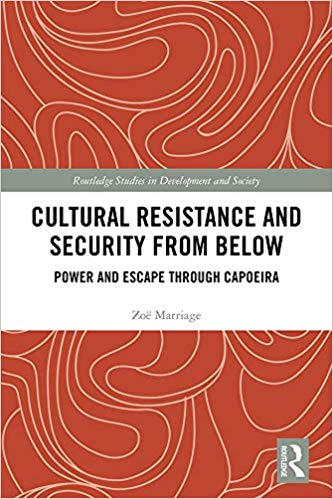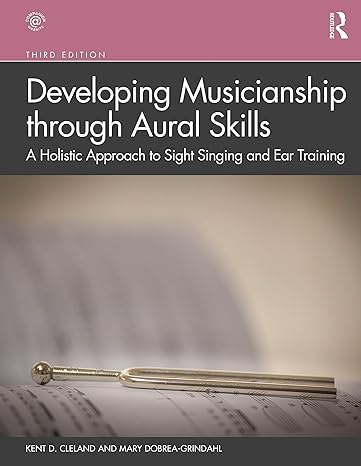This book uses the Afro-Brazilian art of capoeira to examine how security has been pursued from below and what significance this has for security analysis and policy. Illegal at the beginning of the twentieth century, capoeira is now a cultural institution and export that is protected by the Brazilian state and recognised by UNESCO, with capoeira players protecting and promoting their interests through the practice and development of their art. The book brings the musical and corporeal narrative from capoeira into conversation with debates on security; these have typically been dominated by northern, white, military voices, and as a result, the perspective of the weaker player is routinely overlooked in security literature and policy making.
Bringing the perspective of the weaker party, Cultural Resistance and Security from Below examines the distribution of security from two angles. First, it presents the history of the interaction between capoeira players and the Brazilian society and state that resulted in political and legal acceptance of capoeira. Second, it explores how the practice of capoeira generates knowledge of identities, explanations and values, and how this knowledge empowers communities of players and is communicated to society more broadly. The book then turns to consider how capoeira resists within Brazil's contemporary context of insecurity, and what significance the knowledge and power, along with capoeira's core move of escape, have to security analysis and policy. The book concludes by taking the lessons from capoeira to inform understanding of other cultural activities and ways of life as potential sites and forms of resistance.
Conceptually and methodologically original, this book will be of interest to scholars and students in the fields of security studies, development studies, political science and international studies. It will also be of interest to those scholars interested in the changing interaction between politics and the arts.
چکیده فارسی
این کتاب از هنر آفریقایی-برزیلی کاپوئرا استفاده میکند تا بررسی کند که چگونه امنیت از پایین دنبال میشود و چه اهمیتی برای تحلیل و سیاست امنیتی دارد. کاپوئرا در آغاز قرن بیستم غیرقانونی بود، اکنون یک موسسه فرهنگی و صادراتی است که توسط دولت برزیل محافظت می شود و توسط یونسکو به رسمیت شناخته شده است و بازیکنان کاپوئرا از طریق تمرین و توسعه هنر خود از منافع خود محافظت و ترویج می کنند. این کتاب روایت موسیقایی و جسمانی را از کاپوئرا به گفتگو با بحثهایی درباره امنیت میآورد. اینها معمولاً تحت سلطه صداهای شمالی، سفیدپوست و نظامی بوده اند، و در نتیجه، دیدگاه بازیگر ضعیف تر به طور معمول در ادبیات امنیتی و سیاست گذاری نادیده گرفته می شود.
با آوردن دیدگاه حزب ضعیفتر، مقاومت فرهنگی و امنیت از پایین توزیع امنیت را از دو زاویه بررسی میکند. ابتدا، تاریخچه تعامل بین بازیکنان کاپوئرا و جامعه و ایالت برزیل را ارائه می دهد که منجر به پذیرش سیاسی و قانونی کاپوئیرا شد. دوم، بررسی میکند که چگونه تمرین کاپوئرا دانشی درباره هویتها، توضیحات و ارزشها ایجاد میکند، و چگونه این دانش جوامع بازیکنان را قدرتمند میکند و به طور گستردهتری به جامعه منتقل میشود. سپس این کتاب به بررسی چگونگی مقاومت کاپوئیرا در زمینه ناامنی معاصر برزیل می پردازد و دانش و قدرت، همراه با حرکت اصلی گریز کاپوئیرا، برای تحلیل و سیاست امنیتی چه اهمیتی دارد. این کتاب با درسهایی از کاپوئرا به پایان میرسد تا به درک سایر فعالیتهای فرهنگی و شیوههای زندگی بهعنوان مکانها و اشکال مقاومت بالقوه کمک کند.
این کتاب از لحاظ مفهومی و روش شناختی اصیل، مورد توجه محققان و دانشجویان در زمینه های مطالعات امنیتی، مطالعات توسعه، علوم سیاسی و مطالعات بین المللی خواهد بود. همچنین برای آن دسته از محققانی که علاقه مند به تغییر تعامل بین سیاست و هنر هستند، جالب خواهد بود.
ادامه ...
بستن ...
Ebook details:
عنوان: Cultural Resistance and Security from Below Power and Escape through Capoeira (Routledge Studies in Development and Society) (9780367024932)
نویسنده: Zoë Marriage
ناشر: Routledge; 1 edition (June 24, 2019)
زبان: English
شابک: 0367024934, 978-0367024932
حجم: 2 Mb
فرمت: TRU pdf
ادامه ...
بستن ...










